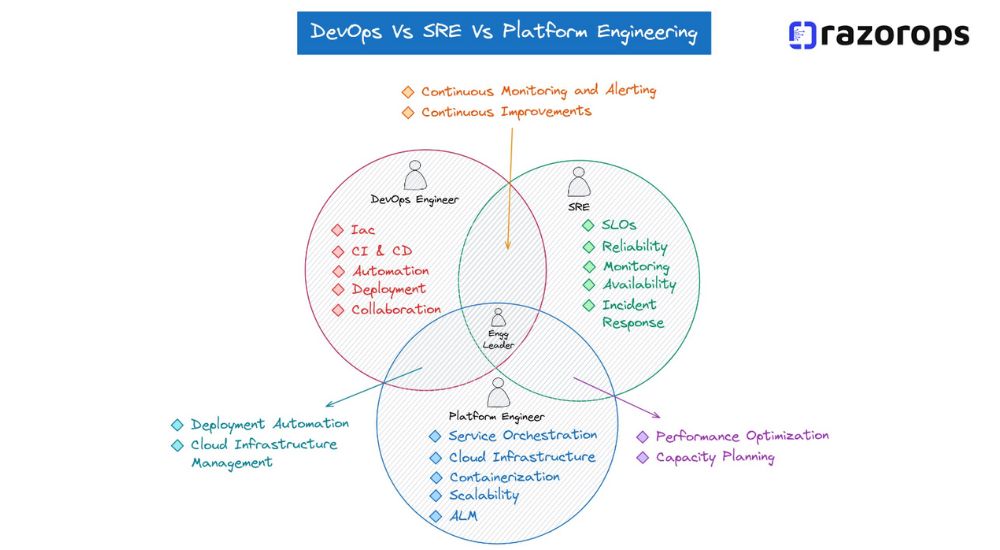Role and responsibelities of DevOps, SRE, Platform Engineering, and Cloud Engineering

DevOps:
Role: DevOps (Development and Operations) is a cultural and professional movement that focuses on collaboration between software development and IT operations teams, aiming to automate and streamline the software delivery process.
Responsibilities:
Facilitate collaboration and communication between development, operations, and other stakeholders.
Implement and maintain Continuous Integration/Continuous Deployment (CI/CD) pipelines for automated software delivery.
Automate infrastructure provisioning and configuration management using tools like Terraform, Ansible, or Puppet.
Monitor application performance and infrastructure health, and implement automated alerting and response mechanisms.
Advocate for and implement best practices such as version control, infrastructure as code, and monitoring as code.
SRE (Site Reliability Engineering):
Role: SRE is a discipline that applies software engineering principles to the design and operation of large-scale, highly available, and reliable software systems.
Responsibilities:
Ensure the reliability, availability, and performance of production systems through automation, monitoring, and proactive maintenance.
Define and enforce Service Level Objectives (SLOs) and Error Budgets to balance reliability and feature development.
Conduct incident management, including root cause analysis, post-incident reviews, and continuous improvement of system resilience.
Collaborate with development teams to design, deploy, and operate scalable and fault-tolerant architectures.
Develop and maintain tools and frameworks for observability, reliability testing, and chaos engineering.
Platform Engineering:
Role: Platform Engineering focuses on building and managing the underlying infrastructure and services that support the development, deployment, and operation of software applications.
Responsibilities:
Design, deploy, and maintain cloud-native platforms and container orchestration systems such as Kubernetes, Docker Swarm, or OpenShift.
Develop and manage shared services and tooling for logging, monitoring, tracing, and security across the platform.
Automate infrastructure provisioning and management using Infrastructure as Code (IaC) tools like Terraform or CloudFormation.
Collaborate with DevOps and SRE teams to ensure the scalability, reliability, and security of the platform.
Provide support and guidance to development teams on platform usage, best practices, and troubleshooting.
Cloud Engineering:
Role: Cloud Engineering focuses on designing, implementing, and managing cloud-based infrastructure and services, leveraging cloud computing platforms such as AWS, Azure, or Google Cloud.
Responsibilities:
Architect and deploy cloud infrastructure solutions that meet performance, scalability, and security requirements.
Optimize cloud resources usage and costs through efficient resource allocation, auto-scaling, and cost management strategies.
Implement and maintain cloud-native services such as serverless computing, managed databases, and container orchestration.
Develop automation scripts and templates for infrastructure provisioning, configuration, and deployment using cloud-native tools and APIs.
Stay abreast of the latest cloud technologies, trends, and best practices, and advocate for their adoption within the organization.
Overall, while there may be some overlap in responsibilities between these roles, each plays a distinct and crucial part in building and maintaining reliable, scalable, and efficient software systems in modern IT environments. Collaboration and communication between these teams are essential for achieving common goals and delivering value to the organization.
